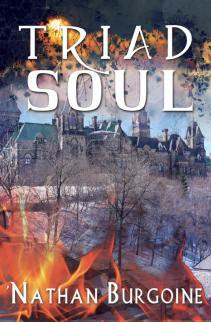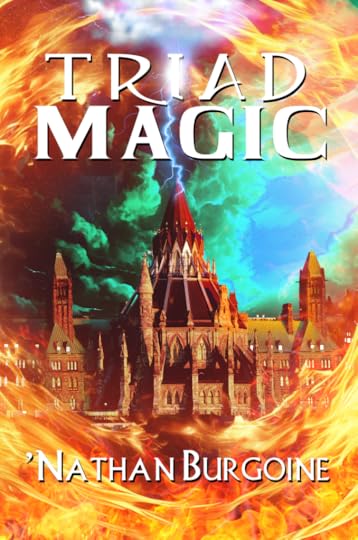The Triad books and stories and “The Way It Has Always Been.”
Now that Triad Magic has been out for about a week—a huge thank you to everyone who picked it up out of the gate, wrote a review, or even started over at the beginning—I wanted to talk about the most singular theme baked into the Triad Books, all the way back to the birth of the idea itself, in the short story “Three” back when it came out as part of the anthology Blood Sacraments.
Which theme? The dangers and damage of always doing things The Way It Has Always Been. Or, as Anders would probably put it, “tradition fucking sucks.”
Tradition Fucking Sucks
Okay, not all tradition, and not every kind of heritage, obviously, but when I set out to write a single piece of Vampire erotica (and, seriously, that was the original goal, not a three-book trilogy and five short stories), the kernel from which the whole idea sprang was a recent re-read of Dracula (because of a story I was attempting to write about the Texan character, Quincey Morris, and the less said about that attempt at a story the better, may the rough draft remain in its coffin forever). In Dracula, the three wives sort of exist only to be temptresses and refer to themselves as sisters a lot and maybe eat babies, but it was the “three” that caught me. Why three?
Well, if you’ve read the Triad books or any of the short stories, the main conceit of the supernatural world the way I built it was that at some point, “the Accords” were created between the major supernatural powers of the world and they decided that until you were part of a group of three, you were more or less a non-entity. It took three wizards working together to create a coven, three demons or were-creatures to form a pack, three vampires to form a coterie, etc. Basically, if you were flying solo—or even paired up—you more-or-less had a target painted on your back.
Oh, and every full moon you needed to renew those bonds with your group, which led to those who were without a group definitely using those three nights of the full moon to enjoy a slice of relative freedom, given they knew those with bonds were busy. This was my nod to “things get wild on a full moon.” The desperate loners only get three nights a month, so they’re going to use them.
“Three,” then, became about a vampire who hadn’t been folded into a coterie, who existed carefully, often hiding, but is out on this first night of the full moon and looking for a snack. He bumps into a lone lust demon he’s met before, Anders, who is in the similar situation of trying to get enough from those three nights to survive the rest of the month (though in his case, it’s about drawing on human souls through seduction, rather than blood) and they don’t like each other. In fact, they’ve got a history of screwing each other over in the chosen-bit-of-prey department for decades, and Luc is annoyed to see Anders has also chosen the same individual for that evening: a young man named Curtis.
Now, spoiler-territory here on a short story over a decade old at this point, but Curtis turns out to be a wizard—one not born to the usual bloodlines of wizard types—and he’s well aware the other two aren’t human, and he’s there to make them an offer: he absolutely doesn’t want to get adopted into one of the wizard Families (capitalized because they’re kind of like an awful, magical mafia, as far as Curtis is concerned, and the Families killed his parents to underline their demand for Curtis to join them or else), and so he did the thing Curtis has been doing since he figured out he was magic: research.
The Letter of the Law
In “Three,” Curtis puts forth a theory. The Accords are all about the number three, saying groups of three and how three is the minimum but—and here’s the crux of his plan—nowhere does it specifically say those three have to be of the same kind. It’s sort of inferred, and given the history of the vampires and the wizards (they fought) and the history of the wizards and the demons (wizards often bound and controlled demons) and basically every supernatural community out there being total dicks to the other communities, three different individuals forming a group of three just hasn’t really come up.
Subverting the letter of the law to grab some freedom has always felt very queer to me. Technicalities, wiggle-room, “it doesn’t actually say I can’t wear my pajamas in the dress code, Principal…” all that sort of stuff is totally my jam. So Curtis the wizard, Anders the demon, and Luc the vampire attempt to form a bond of their own, and it works.
In fact, it works better than groupings of the same kind. Turns out there’s strength in their differences—look, I did say I was doing this queerly, right?—and their abilities grow in strange ways the longer they’re bound to each other. That ended up being explored in four other short stories before I wrote the first book, Triad Blood, and exploring the danger and damage done when we assume “the way it’s always been done” is inherently of value. The status quo thrives on that assumption.
As a queer fella, I loathe that assumption, and I don’t think it’s true. (I also throw a few punches at another trope of fantasy that I can’t stand, the “powerful bloodline” thing, where power is all about family, but maybe that’s a post for another day since this is already a big blog.)
I’m Sorry, How Many Stories?
Yeah, so, like I said, the Triad characters started in a short story, and things sort of snowballed from there. Fair warning, the original Triad short stories are all from gay erotica collections, so they’re a lot more NSFW than the novels, which are more firmly grounded in the contemporary fantasy genre. That said, if you wanted everything in order, here’s how it would go:
“Three,” a short story told from Luc’s point of view, where he and Anders pick the same prey on the night of the full moon, Curtis, but Curtis proves strangely resistant to their charms, which leads them to the unthinkable: working together. What’s a threesome among longtime enemies, anyway? You can find “Three” as a single release, or as part of the anthology Blood Sacraments.“Intercession,” a short story told from Anders’s point of view, where an angel pops in to inform Anders he has a shot at spiritual redemption now that he’s borrowing a bit of Curtis’s soul—but he’ll have to not act demonic. Given other demons are attacking the trio, that’s not as easy as it sounds. You can find “Intercession” as part of the anthology Wings. “Possession,” a short story told from Curtis’s point of view, where the realities of sharing his home (and occasionally beds) with a vampire and a demon is making Curtis face up to the reality of what he’s signed up for, and also puts him in opposition to the Families who more or less run Ottawa from behind the shadows. Also he meets a fellow “Orphan” (a wizard not born to those Families) who was adopted into one of the bloodlines, and starts to wonder if he’s made a mistake. (Not-a-spoiler: He hasn’t.) You can find “Possession” as part of the anthology Erotica Exotica. A bittersweet fact about this story is that the late Richard Labonté, who edited Erotica Exoctica, wrote me the most wonderful acceptance letter for this story, and told me I should seriously consider giving Curtis a novel. In many ways, he’s why the Triad books exist at all, alongside me having ideas that stopped “fitting” in short story length.“Necessary Evils,” a short story told from Anders’s point of view, where Anders realizes he’s found another nascent demon—a young man about to come into his own powers, who happens to be a fellow student friend of Curtis—and knows all too well the damage that young man might do if he doesn’t learn the rules, fast. You can find “Necessary Evils” as part of the anthology Raising Hell.Triad Blood came next. By this point, Curtis, Luc, and Anders have settled somewhat into their triad, and have some confidence in their ability to sustain it, but then they get invited to a vampire meeting, and since attendance is required to be made in groups of at least three from any given coterie, they all have to go, even though Curtis and Anders aren’t vampires. It soon becomes clear the head vampire of the city wants them to make any mistake possible so he can stamp them out, and from that point on, they’re fighting to hold onto their freedom—and trying to figure out exactly why this man hates them so much. “Bound,” happened between the first two Triad Books, and isn’t actually about Luc, Curtis, or Anders, but instead from the point of view of Matthew Stirling, a side character in Triad Blood who Curtis meets in passing. Matthew is a young wizard in one of those awful wizard Families I mentioned earlier, and he’s got a problem: he’s inherited the family gift for prophecy from his father, and now his great-grandfather wishes to use him like the family oracle, as their family always has to whoever inherits the gift, and he needs to figure out a way to stay out from under the man’s thumb. Strangely, his gift is suggesting that solution somehow exists with a particular werewolf. You can find “Bound” as part of the anthology Not Just Another Pretty Face.Triad Soul follows. Having settled their position firmly in the supernatural Ottawa power structure, Luc, Curtis, and Anders intended to keep their heads down, but a string of murders threatens the peace, and there’s a strangeness to the deaths that can’t be denied. The three find themselves doing the last thing they ever intended to do: getting involved, trying to stop the murders, and using their unique power and position to stop all-out-war from breaking out among the powers of Ottawa. And finally, Triad Magic concludes the novel trilogy. Old enemies and new combine to put the three men off-balance as a murderer targets those capable of seeing the future: which shouldn’t be possible, since the victims should have seen the violence coming their way. Curtis, Anders, and Luc have to draw on all their resources—and connections—to try and outwit someone who can outmanoeuvre the literal prescient. (Also, you finally find out what Anders does for a living, which was a recurring question I received throughout the books.)So! There you go. That’s every Triad thing. If you’re at the end of this journey with me, thank you. I mean it. I know the delays with the timing of the final novel were frustrating (believe me, I was just as frustrated, but alas tendons only heal so fast), and I really appreciate every single one of you. And it’s possible I’ll revisit this world again, sure, but I don’t have immediate plans for that. That said, if you’ve somehow not heard me cheering about Christian Baines yet, and you’re looking for somewhere to go after a Triad journey, may I suggest Baines’s Arcadia Trust series? His take on a supernatural Sydney is fantastic, and Baines does awesome things with many of the paranormal tropes. Start with The Beast Without, and then keep going…



